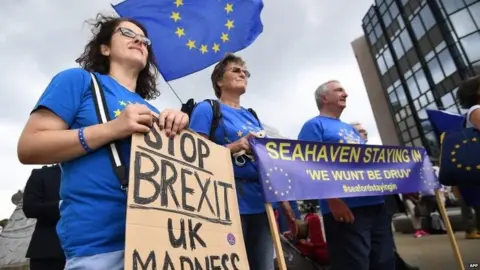Brexit: 'Significant differences' over exit bill says Davis
 PA
PAThe differences between the UK and EU over the Brexit "divorce bill" remain significant, David Davis has said.
The Brexit Secretary told MPs the UK was rigorously vetting the EU's demands and the two sides had "very different legal stances" over what was owed.
While overall talks were proving "tough and at times confrontational", he said he hoped they could be widened to open dialogue on trade after October.
Labour said "fantasy was meeting brutal reality" in what was achievable.
The UK has said it is ready to "intensify" talks about the EU's exit - due to take effect in March 2019 - rather than stick to its one-week-a-month schedule.
EU officials have warned over the progress of negotiations and said the UK must "start negotiating seriously".
Updating MPs on the most recent round of talks as Parliament returned from the summer recess, Mr Davis said "concrete progress" had been made over the summer in areas such as protecting the rights of British expats in the EU to access healthcare and over the future of the Irish border.
Characterising the UK's approach to the negotiations as "much more flexible and pragmatic" than the EU's, he said he still hoped "if possible" that a summit of EU leaders in October would decide to extend the talks to discuss the UK's future relationship with the EU.
'Proper way'
On the issue of money, while the UK and the EU would honour their "financial obligations to each other on exit", he said the EU was trying to use the tight timetable for concluding negotiations to pressure the UK into agreeing a deal.
"It is clear that the two sides have very different legal stances," he said.
"(EU chief negotiator) Michel Barnier and I agreed that we do not anticipate making incremental progress on the final shape of the financial deal in every round ... it is also clear there are significant differences to be bridged in this sector."
The UK would not be bounced into an agreement, he added. "Does Labour want to pay £100bn to get progress in the next month?", he told MPs. "I hope not. We will do this the proper way."
European Commission President Jean-Claude Juncker has said the final divorce bill could be around 60bn euros (£55bn) but Mr Davis has dismissed reports the UK secretly agreed a figure of up to £50bn.
But shadow Brexit secretary Sir Keir Starmer said the slow progress was "becoming a real cause for concern" and there would be serious consequences if talks on trade were pushed back.
 AFP
AFP"Too many promises have been made about Brexit that cannot be kept", he said. "The Secretary of State has just said nobody was pretending that it would be easy - Mr Speaker, they were pretending it would be easy."
Former Conservative Chancellor Ken Clarke urged the government to remain in the single market and customs union during any Brexit transitional period, a position also supported by Labour.
But Mr Davis said that while there was consensus for the need for an implementation period to bed in the changes, the UK was seeking entirely separate but parallel arrangements on customs and trade.
Tory backbencher Jacob Rees-Mogg warned the EU against demanding money "with menaces", saying it was ridiculous for the EU to seek a "dowry" from a country that was a net beneficiary to its budget.
The minister's update comes as MPs prepare to debate for the first time the government's EU withdrawal bill, which will transfer existing EU legislation into domestic UK law.
'Unlimited powers'
Labour has already announced it will vote against the bill at second reading - the first stage of its passage through the Commons - on Monday because they think it will allow ministers to "grab powers from Parliament to slash rights at work and reduce protection for consumers and the environment".
It has also been suggested that some pro-EU Conservative MPs could back Labour attempts to make changes to the bill.
Mr Davis said anyone actively opposing the bill would have to answer to their constituents, insisting that the legislation was a "practical bill designed to protect the interests of British business and British citizens - that is what it is there for, nothing else".
Over the summer break, Labour changed its position to back the single market and customs union for a four-year transition period.
Labour leader Jeremy Corbyn said his MPs "will not allow this government to destroy parliamentary democracy by giving themselves unlimited powers".
But, speaking in the Commons, Labour MP Kate Hoey said that while it was reasonable for details of the withdrawal bill to be scrutinised in committee, anyone voting against the principle of the legislation would be "betraying the will" of the people.
The Scottish National Party, the third largest party in the Commons with 35 MPs, urged Labour to work with it to oppose the EU Withdrawal Bill.
The SNP's Stephen Gethins said: "This debate is about more than just one party or one part of the UK. It is up to parties and MPs from across these islands and the political spectrum to come together and work for a better deal and hold the Government to account."
Brexit is scheduled to take place in March 2019, but Number 10 said it would rather have a rolling series of meetings than the current one-week-a-month talks.